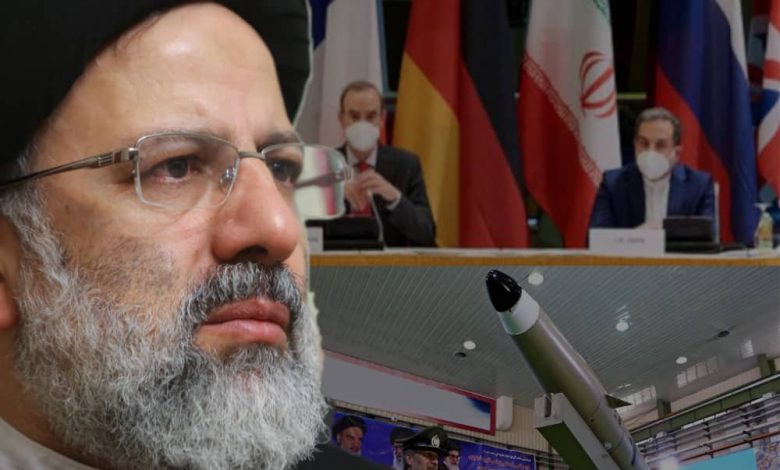Iran Election 2021: Ebrahim Raisi and JCPOA

Written by
Mohammad Sadat Khansari
Iran’s regime will hold its sham presidential election on June 18. While Iranians have increased their calls to boycott the election, the international community’s main concern is the new president’s attitude about the regime’s nuclear program and negotiations.
The regime’s Supreme Leader Ali Khamenei used the Guardian Council, tasked with vetting candidates, to pave the way for Ebrahim Raisi to become the regime’s next president. Paving the way for Raisi is part of Khamenei’s policy to consolidate power in the regime. The main reason for Khamenei to pull Raisi out of the ballot box, despite his dark record of human rights violations, is to face Iran’s restive society and the organized Resistance movement. Yet, Raisi’s selection would affect the regime’s relationship with the western countries and race toward an atomic bomb, as it is a part of Khamenei’s policy of consolidating power in his regime.
Who is Ebrahim Raisi, a candidate in Iran presidential election and an executioner in 1988 massacre
Developing or procuring nuclear weapons is a key pillar of the Iranian regime’s survival strategy. The mullahs soon realized that a young and vibrant Iranian society and a burgeoning democratic opposition represented serious challenges to their backward rule. The mullahs adopted a new strategy that ultimately led them to pursue nuclear weapons technology as an insurance policy against their eventual downfall. The regime continued its nuclear program for years in secrecy.
But, in August 2002, the Iranian Resistance revealed the existence of nuclear sites in Iran. This revelation and the subsequent revelations in the upcoming years alarmed the international community to act. Thus, the United Nations Security Council imposed sanctions on the regime, besides sanctions imposed by the United States and other Western powers.
Sanctions prevented the regime from continuing its illicit activities, such as funding terrorist groups in the region. Due to the regime’s institutionalized corruption, Iran’s economic crises worsened, and society was on the verge of an explosion. Thus, the regime was forced to sign the Joint Comprehensive Plan of Action (JCPOA) or Iran nuclear deal with world powers.
Iran nuclear deal crisis: Who is to blame?
However, the regime had never abided by its commitments under the terms of the JCPOA and was pursuing its nuclear weapons program. In less than a year since the US pulled out of the deal, the regime achieved 60% uranium enrichment and reinstalled centrifuges. These rapid actions showed how flawed the JCPOA was and how it never had fully controlled the regime’s nuclear program.
The major Iran protests in 2018 and 2019 rattled the regime’s foundations. Facing a restive society and sensing his regime’s immediate downfall, Khamenei seeks a nuclear bomb to prolong his regime’s life. To implement this plan, the regime started nuclear extortion campaign. First, the regime’s parliament adopted a plan, allowing the government to halt giving the recordings of the cameras installed by the International Atomic Energy Agency (IAEA) at the regime’s nuclear site unless the US lift all sanctions and return to the JCPOA. The deadline for this plan was May 21, 2021. Yet, finally, the regime had to extend this deadline. Khamenei knows that the international community will not easily succumb to his demands. But he wants to drag his feet to achieve a nuclear bomb as a part of its plan to consolidate power in the regime.
Following his recent visit to Iran, Mr. Rafael Grossi, the Director-General of the International Atomic Energy Agency (IAEA), expressed concern over the regime’s nuclear activities and lack of cooperation.
“The IAEA’s recent statement is for overshadowing Iran’s internal affairs, including the presidential election,” said Abolfaz Zohrehvand, one of the regime’s nuclear experts.
In other words, Zohrehvand confirmed the regime’s sham election and highly probable selection of Raisi would have effects on the regime’s nuclear program.
Fitting a Square Peg into a Round Hole with Iran Negotiations – April 2021
The regime seeks to blackmail the international community into returning to the JCPOA and receive incentive packages from the west.
Yet, Khamenei knows that due to the regime’s destructive presence in the region, the US and the European powers are willing to address the regime’s terrorism and ballistic missile program and Tehran’s “break out time” in reaching a nuclear bomb.
“Although the sixth round of the Vienna talks has not yet taken place, the administration of US President Joe Biden has previously stated that the Vienna talks aim to strengthen and extend the JCPOA while using it as a platform to discuss Iran’s defense, missile, and regional issues,” wrote the state-run Resalat daily in this regard on June 9.
Resalat daily underlines that the US demands “mean nothing more than the “official transition of the West from the UN Security Council” and the transformation of the nuclear agreement into a “foundation” for entering into post-JCPOA discussions.”
Thus, Khamenei has decided to unipolar his regime and race toward an atomic bomb as a part of his policy to consolidate power in the regime. Khamenei’s nuclear ambitions align with his decision to select Raisi as president, increase domestic human rights violations, and export terrorism.
In other words, by selecting Raisi, Khamenei and his regime will continue human rights violations, export terrorism, and secretly advance toward a nuclear bomb. The latter fact could be achieved by having long and fruitless discussions with the western powers.
Therefore, the JCPOA signatories should increase pressure on the regime instead of providing incentive packages, which would only encourage the regime to continue its malign activities. Adopting a firm policy toward the regime connects with the Iranian people’s demand for regime change and increasing call for boycotting the regime’s sham election.

